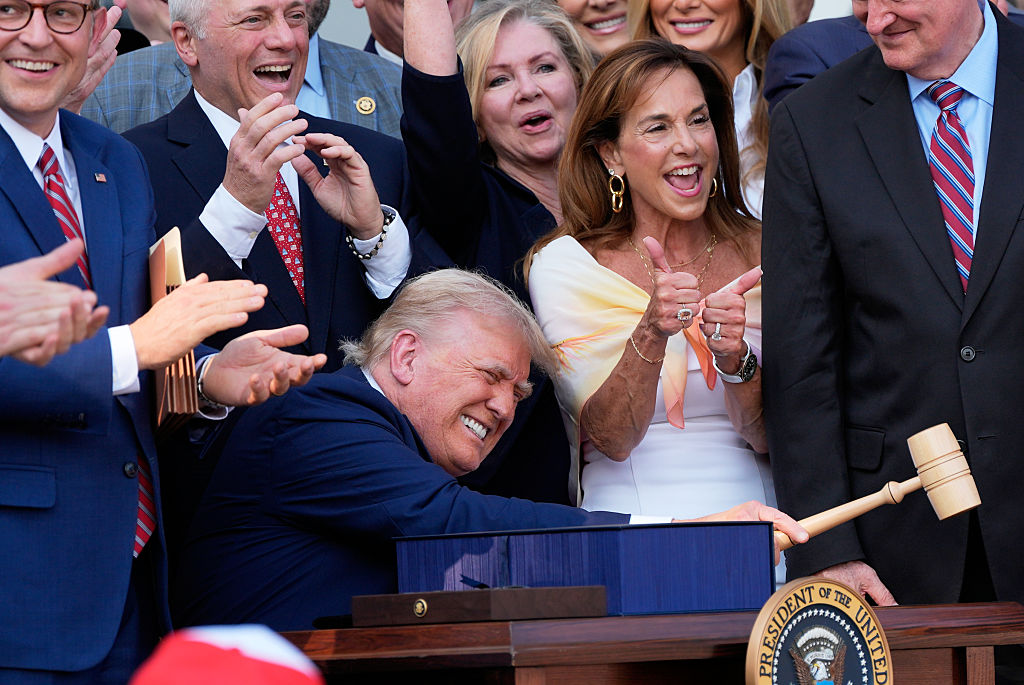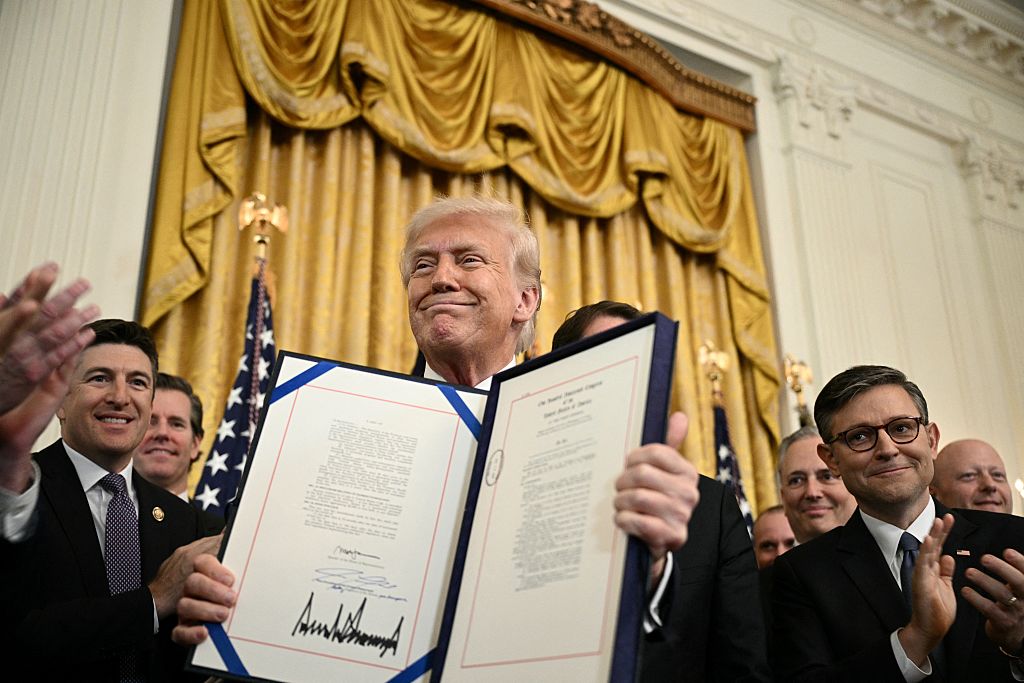What will be the consequences of Donald Trump’s "One Big Beautiful Bill"?
The US president’s "One Big Beautiful Bill", an extraordinary mix of tax cuts and spending plans, has made it through both houses of the US Congress. What will be the consequences?

Get the latest financial news, insights and expert analysis from our award-winning MoneyWeek team, to help you understand what really matters when it comes to your finances.
You are now subscribed
Your newsletter sign-up was successful
Want to add more newsletters?

Twice daily
MoneyWeek
Get the latest financial news, insights and expert analysis from our award-winning MoneyWeek team, to help you understand what really matters when it comes to your finances.

Four times a week
Look After My Bills
Sign up to our free money-saving newsletter, filled with the latest news and expert advice to help you find the best tips and deals for managing your bills. Start saving today!
What’s in Trump's "Big Beautiful Bill"?
The “One Big Beautiful Bill” – narrowly passed by both houses of Congress – is an “omnibus” bill incorporating a vast array of tax and spending plans, some of which will require further legislation.
The most important move is to make permanent the hefty tax cuts of Donald Trump’s first term that were set to expire at the end of 2025 – this will cost the federal government $4.6 trillion over ten years. There are also some new tax cuts, including tax breaks on tips and overtime pay, but only until 2028.
On the spending side, the bill boosts spending on defence and immigration enforcement, and slashes more than $1 trillion in federal spending on social and medical programmes and clean-energy credits. The Congressional Budget Office (CBO) watchdog estimates 11.8 million Americans could lose health insurance by 2034 due to the changes.
MoneyWeek
Subscribe to MoneyWeek today and get your first six magazine issues absolutely FREE

Sign up to Money Morning
Don't miss the latest investment and personal finances news, market analysis, plus money-saving tips with our free twice-daily newsletter
Don't miss the latest investment and personal finances news, market analysis, plus money-saving tips with our free twice-daily newsletter
Is Trump's "One Big Beautiful Bill" a sensible package?
Not remotely, says The Economist. It’s a “showcase for fiscal incontinence and ideological exhaustion”, which will attach “to a body of government-shrinking Reaganism an appendage of populist Trumpism”. It is also disfigured by carve-outs and pork-barrel incentives granted to individual lawmakers in the scramble to get it through Congress – and its effects will “menace” the US economy for a decade.
The package doesn’t make sense politically or economically, agrees Gabriel Rubin on Breakingviews. Politically, it’s likely to prove the “most Pyrrhic of victories” as its damaging effects on Trump’s rank-and-file supporters become clear.
What about economically?
Trump’s attitude towards clean energy, tech and the bill’s wholesale retreat from swathes of advanced manufacturing and energy technology will have the Chinese rubbing their hands with glee and their eyes with disbelief, says Ambrose Evans-Pritchard in The Telegraph. The US has abandoned a central front of the Sino-American struggle without a fight, and “has just dropped a big, beautiful, bunker-busting bomb on its own economy”. Rapidly phasing out support for nascent solar and wind industries threatens to “accelerate the effects of climate change, slow job creation and thwart the ascent of power-hungry artificial intelligence”, agrees Rubin. And other spending cuts look misconceived – a dollar in Medicaid spending, for example, leads to more than a dollar’s worth of economic activity. Even more worrying is that the lust for lower taxes will “mortgage the country’s future by teeing up a fiscal disaster”. Trump’s “big, beautiful bill… will get ugly, fast”.
What’s the fiscal impact of Trump's "One Big Beautiful Bill"?
The CBO estimates the package will raise federal deficits by $3.4 trillion over a decade (that’s over and above the existing annual deficits of about $2 trillion). That’s spooked many economists, especially given the US dollar has already fallen 10% this year on fears over long-term fiscal and economic stability.
Currently, the US debt pile is roughly $36 trillion, or 125% of GDP – not far off the 146% seen in Greece at the height of the eurozone debt crisis. Since 2010, the US national debt has ballooned from $13 trillion (or 90% of GDP) in 2010. And on current tax and spending trends, it is projected to hit about $60 trillion by 2035.
According to calculations by Ray Dalio, founder of hedge fund Bridgewater Associates, the Trump package will increase the US national debt from about $230,000 per American family to $425,000 per family. If steps aren’t taken to change this trajectory, says Dalio, “big, painful disruptions will likely occur”.
Haven’t we heard this before?
Fiscal hawks have been “predicting a debt-driven financial blow-up” in the US for decades, says John Cassidy in The New Yorker. It hasn’t happened. The underlying strength of the US economy, the global appeal of dollar-denominated assets, and the “belief that, in a pinch, Congress would react responsibly have staved off catastrophe”. But “nobody can predict how long this safety net will hold”. If Trump persists with his attacks on the US central bank, the Federal Reserve – and especially if he succeeds in replacing its boss, Jerome Powell, with someone more agreeable to big, inflationary interest-rate cuts – there would be a real risk of a “Turkey-style outcome, in which the markets lose faith in a highly indebted government led by an autocratic right-wing populist, with dire consequences for stocks, bonds, the currency and the economy at large”.
Are things really that serious?
Yes. Goldman Sachs calculates that, if Congress postpones fiscal tightening for another decade, the US might need to cut spending or raise taxes by an annual 5.5% of GDP to stabilise the debt-to-GDP ratio.
What Trumpites appear to be hoping, says Kenneth Rogoff in the Financial Times, is that a sustained return to ultra-low real interest rates will ultimately save the day. “But should the US, which aims to be global hegemon for another century or more, be betting the farm on this?” Clearly not. Over the past 15 years, US growth has been underwritten by historically low interest rates. But higher rates mean debt servicing costs will eat up an ever bigger slice of the budget, with all the risks that entails.
What risks are those?
At some point, the US will face a bond-market backlash, debt spiral and fiscal blow-up, says Gerard Baker in The Times. “Trump may yet get lucky and avoid his Liz Truss moment, but the spectre of the former prime minister’s fate awaits some American some day.” If the ballooning debt pile were accompanied by a serious and coordinated economic and industrial strategy, it might start to make sense, says Kyla Scanlon in The Free Press. Alas, of that there is no sign. While the US cuts taxes in the hope that will create new industry, China continues to directly invest in advanced manufacturing, critical minerals and industrial capacity. This deficit expansion without a purpose is a high-risk gamble. “The extraordinary cost will come due eventually, and America’s young people will be left to pay it.”
This article was first published in MoneyWeek's magazine. Enjoy exclusive early access to news, opinion and analysis from our team of financial experts with a MoneyWeek subscription.
Get the latest financial news, insights and expert analysis from our award-winning MoneyWeek team, to help you understand what really matters when it comes to your finances.
-
 How a ‘great view’ from your home can boost its value by 35%
How a ‘great view’ from your home can boost its value by 35%A house that comes with a picturesque backdrop could add tens of thousands of pounds to its asking price – but how does each region compare?
-
 What is a care fees annuity and how much does it cost?
What is a care fees annuity and how much does it cost?How we will be cared for in our later years – and how much we are willing to pay for it – are conversations best had as early as possible. One option to cover the cost is a care fees annuity. We look at the pros and cons.
-
 How a dovish Federal Reserve could affect you
How a dovish Federal Reserve could affect youTrump’s pick for the US Federal Reserve is not so much of a yes-man as his rival, but interest rates will still come down quickly, says Cris Sholto Heaton
-
 New Federal Reserve chair Kevin Warsh has his work cut out
New Federal Reserve chair Kevin Warsh has his work cut outOpinion Kevin Warsh must make it clear that he, not Trump, is in charge at the Fed. If he doesn't, the US dollar and Treasury bills sell-off will start all over again
-
 How Canada's Mark Carney is taking on Donald Trump
How Canada's Mark Carney is taking on Donald TrumpCanada has been in Donald Trump’s crosshairs ever since he took power and, under PM Mark Carney, is seeking strategies to cope and thrive. How’s he doing?
-
 Why does Trump want Greenland?
Why does Trump want Greenland?The US wants to annex Greenland as it increasingly sees the world in terms of 19th-century Great Power politics and wants to secure crucial national interests
-
 'Investors should brace for Trump’s great inflation'
'Investors should brace for Trump’s great inflation'Opinion Donald Trump's actions against Federal Reserve chair Jerome Powell will likely stoke rising prices. Investors should prepare for the worst, says Matthew Lynn
-
 The steady rise of stablecoins
The steady rise of stablecoinsInnovations in cryptocurrency have created stablecoins, a new form of money. Trump is an enthusiastic supporter, but its benefits are not yet clear
-
 A change in leadership: Is US stock market exceptionalism over?
A change in leadership: Is US stock market exceptionalism over?US stocks trailed the rest of the world in 2025. Is this a sign that a long-overdue shift is underway?
-
 King Copper’s reign will continue – here's why
King Copper’s reign will continue – here's whyFor all the talk of copper shortage, the metal is actually in surplus globally this year and should be next year, too